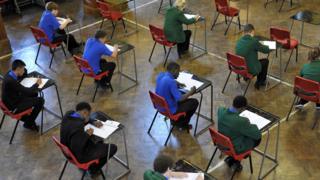[ad_1]

In London more than 40% of pupils get extra help from private tutors
An east London secondary school with high levels of deprivation is paying for private tuition to help pupils with their GCSE exams.
Urswick school in Hackney is buying one-to-one lessons with its “pupil premium” money, given to schools to support disadvantaged pupils.
Assistant head Naomi Dews said her pupils should not miss out on private tuition available to richer families.
“Why should they be penalised by where they’re born?” she said.
Funding pressures
But the National Education Union says schools “should not have to resort to using pupil premium money to provide tuition”.
The union’s co-leader Kevin Courtney says schools should have enough funding for their own staff, without having to use the pupil premium to buy in additional support.
Although parents might pay for extra lessons for their children, it is unusual for a school to use its budget this way.
According to research from the Sutton Trust education charity, 41% of pupils in London get private tuition.
But Ms Dews says in her school almost none of her pupils’ families can afford a tutor.
Her school has very high levels of deprivation – about three quarters of pupils are eligible for pupil premium payments, compared with a national average of about a quarter.
Image copyright
Getty Images
The school is using £10,000 of its pupil premium per year to pay for the tuition
Ms Dews says the school decided to level the playing field by using £10,000 per year of its pupil premium to pay for tuition for students taking or re-taking GCSE maths.
“It opens a huge number of doors if you can pass at English and maths,” she says.
More confidence
The maths department picks 35 students who would benefit from an hour per week of individual tuition, delivered in the school day through an online connection to teachers from the MyTutor firm.
“It’s a great help for some students with less confidence and resilience,” says Ms Dews.
“It’s not a substitute for a teacher, but it has real advantages.
“It’s one to one, they can ask questions they want, they can go back to lessons they didn’t understand,” says Ms Dews.
Image copyright
Getty Images
Access to private tutors gives wealthier families an advantage, says the Sutton Trust
But why couldn’t the school provide the tuition itself?
“There isn’t a spare teacher who could cover 35 hours per week,” she says.
It would mean hiring another teacher, and apart from maths teachers being in short supply, it would be more expensive for the school.
Hidden advantage
Stacey, a pupil who has been using the maths tutors, says she has “definitely made progress”.
“You can spend time on things you struggle with,” she says. “All young people should have the same opportunity.”
Jalen said it helped to be “able to work at my own pace”.
Schools across England have received about £2.4bn in pupil premium funding this year, based on factors such as pupils on free school meals or children in local authority care.
The purpose is to raise the achievement of disadvantaged pupils, but it is up to individual schools to decide how to use their allocation.
Research from the Sutton Trust and the National Foundation for Educational Research has shown the use of tutors is skewed towards wealthier families and to those living in London.
It found that 27% of secondary school pupils had private tuition – but this rose to 34% in better-off households and 41% for pupils in London.
The Sutton Trust has warned this is a hidden form of advantage in exam results.
Teacher shortages
Head teachers’ leader Geoff Barton backed the use of pupil premium for private tuition, saying school leaders should make their own decisions about what made the biggest difference.
“The evidence shows that one-to-one tuition can be an effective approach to boosting progress,” said the leader of the Association of School and College Leaders.
“However it is expensive to provide this additional level of support in schools and buying in a service could be a cost-effective method of supporting students in this way,” said Mr Barton.
But the National Education Union said the scheme was a reflection of school funding problems and teacher shortages.
“The idea of doing this would not even occur to schools if they were able to recruit and retain enough maths teachers,” said Mr Courtney, the union’s joint general secretary.
“What is needed is for all schools to have the funding and the staff necessary to ensure every child gets the education they deserve,” he said.
[ad_2]
Source link
